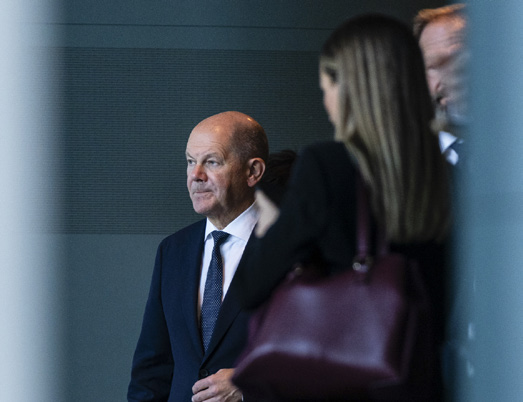
By Christopher F. Schuetze
On Wednesday, German Chancellor Olaf Scholz dismissed his finance minister, bringing an end to his three-party coalition and undermining his center-left administration just as Donald Trump’s election in the U.S. posed new economic and security challenges for Europe.
“I would have preferred to avoid this challenging decision,” Scholz stated during an unscheduled press conference at the chancellery Wednesday night, following days of negotiations aimed at preserving the coalition. “Particularly at times like these, when uncertainty is on the rise,” he remarked.
Scholz pledged to continue governing through the end of the year and to seek a confidence vote in parliament in January, a challenge he could potentially fail. This failure could lead to early elections, which have been rare in Germany since World War II, potentially occurring in March.
The unprecedented crisis in Berlin leaves the European Union increasingly directionless at a notably difficult juncture. France’s government is in turmoil following elections that resulted in a stalemate in parliament, while Russia has made significant military gains in Ukraine and continues to pose a broad threat to Europe.
Europe now confronts the likelihood of a trade conflict with the United States and a diminishing of the NATO alliance — both of which have been threatened by Trump — as Germany, its most populous nation, also grapples with political turbulence.
The disintegration of the coalition in Germany occurred after the leaders of the three parties — Scholz’s Social Democrats, the leftist Greens, and the pro-business Free Democrats — had largely ceased communication with each other in recent weeks due to escalating disagreements over the negotiations for a new federal budget.
On Wednesday evening, the animosity between Scholz and Christian Lindner, the leader of the Free Democrats and his finance minister, was clearly evident as Lindner spoke to reporters 30 minutes following the chancellor’s address.
“Olaf Scholz has unfortunately demonstrated that he lacks the strength to provide our country with a fresh start,” said Lindner, who deemed Scholz’s proposals for stimulating economic growth “bland and lacking ambition.”
Scholz responded by accusing Lindner of being irresponsible for his unwillingness to find common ground.
The coalition, which has steered Germany since Angela Merkel’s departure in 2021, was a fragile alliance from the outset. Being the first three-party coalition since the early 1960s, many within the government attribute its instability and frequent disruptions to this complexity.
The coalition’s collapse is shocking for a country historically recognized for its methodical and predictable consensus, which has avoided the political upheavals seen among some of its more volatile European counterparts. It could herald a new phase of political instability for Germany as far-right and far-left populist parties gain traction in an increasingly fragmented political landscape.
Speculation about the coalition’s collapse had intensified since last week after Lindner released a position paper, which was leaked to the media, that critiqued the progressive fiscal strategies of his left-leaning coalition partners.
Many of his suggestions, such as phasing out national climate initiatives or cutting social services, appeared aimed at provoking them. Analysts viewed the paper as Lindner’s maneuver to engineer his own exit from the coalition without directly leaving it. The opposition labeled it the “divorce document.”
Scholz and Robert Habeck, Germany’s economy minister from the Greens, had initially attempted to maintain the coalition’s unity. Advocating for “pragmatism” in a social media post on Monday, Scholz remarked: “Coalition governments can be challenging. However, we are an elected government, and there are critical issues to resolve.”
Central to the conflict was a budget deficit of approximately 10 billion euros, or $10.7 billion, for the 2025 budget.
On Monday, Habeck endeavored to keep Lindner in the cabinet by proposing several billion euros designated as a subsidy for a proposed Intel factory to help reconcile the budget. “This is the worst possible moment for the government to collapse,” he stated to reporters then.
On Wednesday, Habeck described the dismissal as “logical yet unnecessary,” explaining that various proposals were available to satisfy Lindner’s economic requirements.
Furthermore, on Wednesday, Scholz declared that his Social Democrats would lead as a minority government in conjunction with the Green Party until at least the year’s end. They will need to secure parliamentary support on an issue-by-issue basis to enact any legislation.
On specific matters — particularly aid to Ukraine, military rebuilding, and immigration control — they may be able to rely on the backing of the opposition Christian Democrats, who share similar perspectives.
“Germany is Europe’s largest economy and the biggest contributor to the EU budget; they require certainty,” commented Sudha David-Wilp, regional director of the German Marshall Fund, a think tank based in Berlin. “A minority government signifies instability for both the nation and its European partners,” she continued.
Ultimately, such an arrangement can only function with the tacit cooperation of the conservative Christian Democratic Union, or CDU, which is the largest opposition party and leads in opinion polls for the upcoming election.
“We cannot tolerate this unstable government for a single day longer,” Carsten Linnemann, the party’s secretary-general, stated to the German tabloid Bild earlier this week.
The Scholz coalition advertised itself as a fresh start following the slow-paced Merkel years. The partners adeptly addressed urgent issues early in its tenure after Russia’s invasion of Ukraine in 2022 and Germany’s cessation of Russian gas imports.
However, a ruling from the nation’s highest court in 2023 compelled the government to implement significant budget cuts, causing friction among the partners over the constitutional constraints on borrowing.
The final rupture occurs against a backdrop of a stagnant German economy, which is anticipated to contract by 0.2% in 2024, marking the second consecutive year of stagnation. The nation is the weakest member of the Group of 7 and among the euro-using nations.
